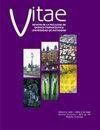Anxiolytic-like activity of Aloysia virgata var. platyphylla leaves extract in mice
Q3 Pharmacology, Toxicology and Pharmaceutics
引用次数: 1
Abstract
Background: Medicinal plants are part of traditional medicine and should be considered a therapeutic alternative for mental diseases. Several plants belonging to the Verbenaceae family have proved useful in treating general anxiety disorders, the most prevalent psychiatric disorders. Objective: This research aimed to verify the extract’s safety, the effect on general behavior, and the effect on sleeping time, as well as to evaluate the anxiolytic-like effect of the methanol extract of Aloysia virgata var. platyphylla (Avp), in mice. Methodology: The toxicity test was done according to the OECD guide (mice groups n=5), and general behavior was observed during the assay. Sleeping time was assessed using the pentobarbital-induced hypnosis method (n=8). Male Swiss albino mice (n=6) were treated with 50 to 400 mg/kg of Avp extract and diazepam as a control. The anxiolytic-like effect was tested through the hole board and elevated plus-maze test. Results: The Avp extract has no side effects in tested doses, and no central nervous system depressant activity was noted. A. virgata var. platyphylla increased exploration (number and time) in the hole board. In the elevated plus-maze, increased number and time into open arms were evidenced compared to the control group. Conclusion: With all these results, we concluded that the Avp extract is safe and has a potential anxiolytic-like activity in the animal model used.白桦叶提取物对小鼠的抗焦虑活性
背景:药用植物是传统医学的一部分,应被视为精神疾病的治疗选择。一些属于马鞭草科的植物已被证明对治疗一般焦虑症有用,这是最普遍的精神疾病。目的:验证白荆(Aloysia virgata var. platyla, Avp)甲醇提取物对小鼠的安全性、对一般行为的影响、对睡眠时间的影响,并评价其抗焦虑样作用。方法:按照OECD指南进行毒性试验(小鼠组n=5),在试验期间观察一般行为。采用戊巴比妥诱导催眠法评估睡眠时间(n=8)。雄性瑞士白化小鼠(n=6)分别给予Avp提取物50 ~ 400 mg/kg和地西泮作为对照。通过孔板法和高架迷宫法检测其抗焦虑样作用。结果:Avp提取物在试验剂量下无副作用,无中枢神经系统抑制活性。白桦增加了在孔板上的探索(数量和时间)。在升高的迷宫中,与对照组相比,张开双臂的次数和时间都增加了。结论:综上所述,我们认为Avp提取物是安全的,并且在所用的动物模型中具有潜在的抗焦虑活性。
本文章由计算机程序翻译,如有差异,请以英文原文为准。
求助全文
约1分钟内获得全文
求助全文
来源期刊

Vitae
PHARMACOLOGY & PHARMACY-
CiteScore
1.20
自引率
0.00%
发文量
0
审稿时长
>12 weeks
期刊介绍:
The journal VITAE is the four-monthly official publication of the School of Pharmaceutical and Food Sciences, and its mission is the diffusion of the scientific and investigative knowledge in the various fields of pharmaceutical and food research, and their related industries. The Journal VITAE is an open-access journal that publishes original and unpublished manuscripts, which are selected by the Editorial Board and then peer-reviewed. The editorial pages express the opinion of the Faculty regarding the various topics of interest. The judgments, opinions, and points of view expressed in the published articles are the responsibility of their authors.
 求助内容:
求助内容: 应助结果提醒方式:
应助结果提醒方式:


